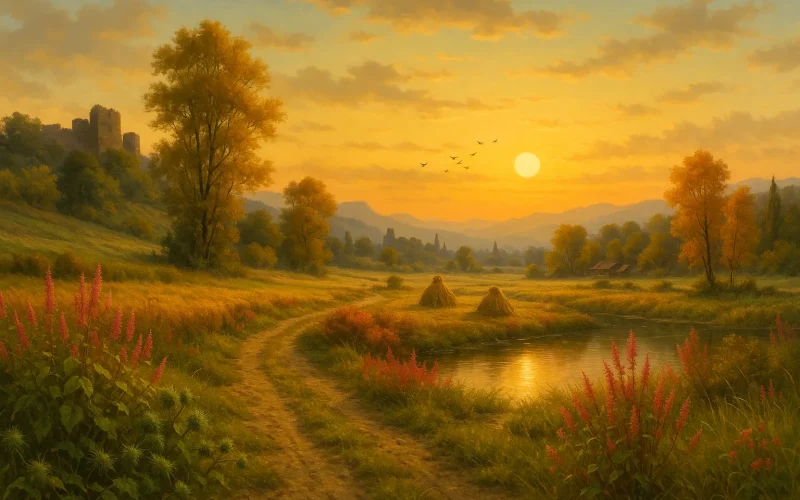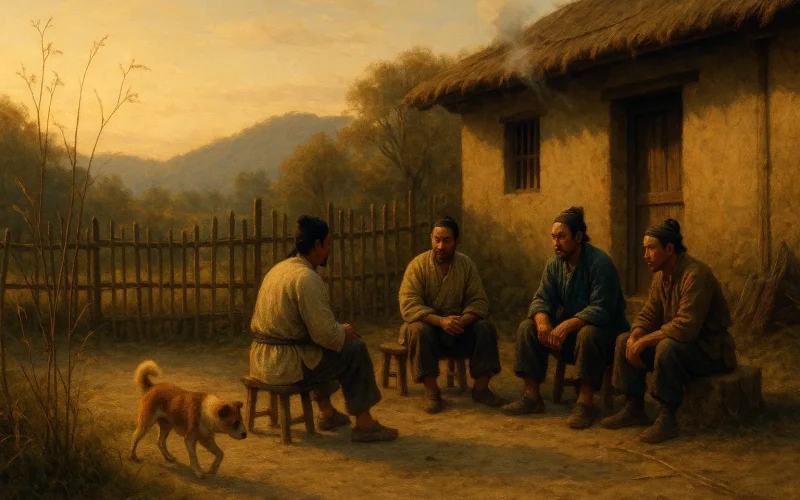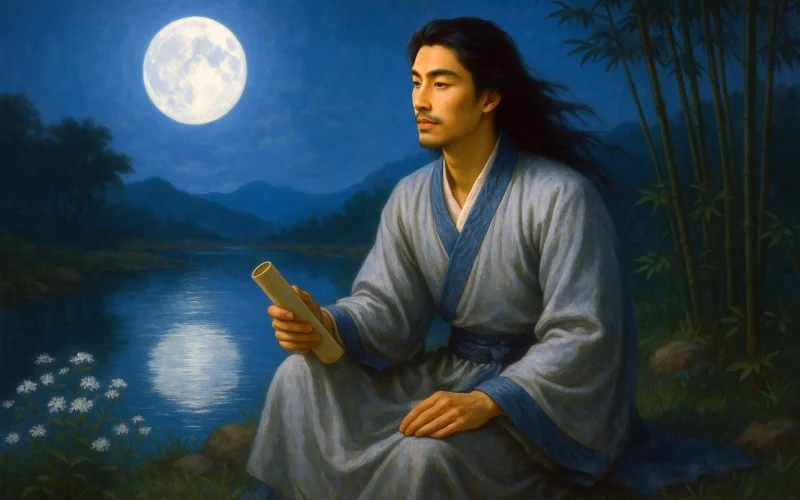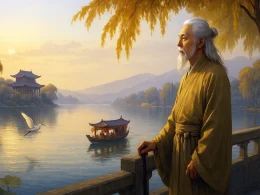Old road overgrown with thorn,
Winding through the ruin's scorn.
Amethyst blooms cloak the shore,
Marsh gleams colder than before.
Harvest done, the woodcutters pass,
Sunset stains their loads with brass.
Wind-combed willows stand threadbare,
Frost-jeweled pears perfume the air.
Wanderers pause at crossroads' sign,
Birds rush to roost in frantic line.
The old farmer grins his creed:
"Mind dark paths—and take my heed:
This year's luck gave modest cheer,
Never scorn coarse porridge here."
Original Poem
「田家三首 · 其三」
柳宗元
古道饶蒺藜,萦回古城曲。
蓼花被堤岸,陂水寒更绿。
是时收获竟,落日多樵牧。
风高榆柳疏,霜重梨枣熟。
行人迷去住,野鸟竞栖宿。
田翁笑相念,昏黑慎原陆。
今年幸少丰,无厌饘与粥。
Interpretation
This poem is the third in Liu Zongyuan's Villager's Songs, composed during his exile in Yongzhou or Liuzhou. Compared to the first two, this poem possesses the gentlest tone and most restrained emotion. If the first depicts the hardship of labor and the second the harshness of taxation, then the third recounts a poet's chance encounter with a farming family and the simple warmth he perceives within it.
By this time, Liu Zongyuan had spent several years in exile. His state of mind had quietly shifted from the initial indignation and resentment to a more settled, observant perspective. He was no longer merely observing the people's suffering from a detached height but had truly entered the villages, forming real connections with the common folk. This poem records just such an autumn dusk—the poet lost in the wilderness, fortunately taken in by an old farmer, and in the farmer's words, sensing a kind of contentment and resilience amidst hardship. The poem contains no critique, no indictment, only a tranquil autumn scene and a heartwarming moment. This calmness in itself is a form of strength.
First Couplet: "古道饶蒺藜,萦回古城曲。"
Gǔdào ráo jíli, yínghuí gǔchéng qū.
The ancient path grows thick with thorny caltrop weed;
It winds and turns, where ancient city walls recede.
The opening, with "ancient path" and "ancient city walls," establishes an atmosphere of aged antiquity and deep seclusion. "Grows thick with thorny caltrop weed" is literal—wild plants bearing thorny fruit by the roadside in autumn—but also implies the path is seldom traveled, remote and wild. "Winds and turns" describes the road's meandering, also foreshadowing the later "the traveler, lost." This couplet not only paints a scene but also pinpoints the poet's isolated environment—he walks a neglected ancient path, far from the world of towns, far from the world he knew.
Second Couplet: "蓼花被堤岸,陂水寒更绿。"
Liǎo huā bèi dī'àn, bēi shuǐ hán gèng lǜ.
Smartweed in bloom clothes all the dyke in red;
The pool, turned chill, a yet more sombre green is spread.
This couplet depicts the autumn scene by the water. "Smartweed" (knotweed/persicaria) is a common waterside plant, blooming red in autumn, complementing the pond's green water. "Clothes" describes the smartweed's profusion, like a blanket of flowers covering the dyke. "The pool, turned chill, a yet more sombre green is spread" is especially fine—autumn water is already clear, and the chill makes it seem a deeper green, a clear, cold, vivid color. This is realistic scenery, yet it also contains the poet's inner feeling of quiet desolation. The red smartweed and green water, one warm, one cold, one bright, one sombre, create the autumn-specific mood where color and bleakness intertwine.
Third Couplet: "是时收获竟,落日多樵牧。"
Shì shí shōuhuò jìng, luòrì duō qiáo mù.
The harvest now is gathered in, the work is done;
At sunset woodcutters and herdsmen, many a one.
This couplet shifts from static scenery to human activity. "The harvest now is gathered in" pinpoints the season—the autumn harvest is over, farm work paused, the village entering a relatively idle time. "At sunset woodcutters and herdsmen, many a one" depicts the quiet return of those who went out for firewood or herding as the sun goes down, a peaceful, lively scene. "Many a one" suggests moving figures, yet not noisy, precisely the tranquil scene unique to a village at dusk.
Fourth Couplet: "风高榆柳疏,霜重梨枣熟。"
Fēng gāo yú liǔ shū, shuāng zhòng lí zǎo shú.
The wind blows high; sparse elm and willow boughs are thinned;
Frost falls; the pears and jujubes, ripened, weight the rind.
This couplet continues describing the deep autumn scene but lifts the gaze from the ground. "The wind blows high; sparse elm and willow boughs are thinned" describes the high branches and leaves withering in the autumn wind; the word "thinned" conveys both visual sparseness and a sense of bleakness. "Frost falls; the pears and jujubes, ripened" describes the low-hanging fruit growing sweet and plump after the frost. "Thinned" and "ripened" form a contrast: leaves wither, yet fruit ripens—in nature's rhythm, there is loss and also gain. This is realism, but it also implies a flavor of human life.
Fifth Couplet: "行人迷去住,野鸟竞栖宿。"
Xíngrén mí qù zhù, yě niǎo jìng qī sù.
The traveler, lost, knows not to stay, nor where to go;
Wild birds contend for roosting-place, as twilight falls.
This couplet turns from scene to person, describing the poet's own predicament. "The traveler, lost" states he is lost—dusk approaches, the way ahead unclear, stranded in the wilds, unsure whether to advance or retreat. "Wild birds contend for roosting-place" uses the birds' return to their nests to contrast the man's lack of a destination. Birds have nests to return to; the man knows not where to lodge. This contrast subtly yet truthfully conveys the poet's loneliness and plight at that moment.
Sixth Couplet: "田翁笑相念,昏黑慎原陆。"
Tián wēng xiào xiāng niàn, hūn hēi shèn yuán lù.
An old man of the fields sees me, and smiling, grieves:
'At fall of night, take care how the wild ground you leave!'
This is the poem's warmest moment. "An old man of the fields sees me, and smiling, grieves"—the word "smiling" perfectly captures the old farmer's simplicity and kindness. Seeing a lost stranger, he is not wary, not indifferent, but shows smiling concern. "'At fall of night, take care how the wild ground you leave!'" is his simple warning: it's getting dark, the wilds are unsafe, be careful. These brief words, without ornate language, are filled with the most fundamental warmth between people. For Liu Zongyuan, exiled, far from home, this care from a stranger must have felt especially precious.
Seventh Couplet: "今年幸少丰,无厌饘与粥。"
Jīnnián xìng shǎo fēng, wú yàn zhān yǔ zhōu.
'The harvest, sir, this year, I thankfully can tell,
Has not been bad, and we've had enough of both, thin and thick, to eat right well.'
The final couplet is the old farmer's words, the crux of the poem. "The harvest, sir, this year, I thankfully can tell, / Has not been bad" — the words "thankfully" and "not been bad" reveal the farmer's low expectations: not a bumper harvest, just "not been bad," meaning a slight surplus, already counted as "luck." "we've had enough of both, thin and thick, to eat right well": "both, thin and thick" refers to thin and thick congee/porridge, the coarsest food. Yet the old farmer says: to have enough of this to eat, he is already content, asks for no more. In this simple speech lies both resilience in life and acceptance of fate. Liu Zongyuan adds no commentary, merely records faithfully, yet allows the reader to feel a deep compassion—these peasants who toil all year ask for nothing but a bowl of porridge.
Holistic Appreciation
This poem uses the poet's journey as a thread, unfolding a complete autumn village scene as the view shifts with his steps. The first two couplets depict the remote ancient path, the smartweed and the pond—a distant view. The third and fourth depict the post-harvest village, the returning woodcutters and herdsmen, the thinning elms and willows, the ripening pears and jujubes—a middle view. The fifth couplet, the poet lost, is a close-up. The final two couplets, the encounter with the old farmer, are a detailed focus. From far to near, from scene to person, it progresses layer by layer, finally settling on a moment both warm and poignant.
Unlike the painful critique of the first two poems, this poem's tone is gentle, its emotion restrained. The poet does not deliberately dramatize suffering, but simply presents an old farmer's state of life and his contentment with a harvest that is "not been bad." Yet it is precisely within this calm and contentment that the reader can more deeply feel life's hardship and the resilience of the common folk. With a poet's sensitivity, Liu Zongyuan captured this moment; with a historian's calm, he recorded it, making this poem the warmest and most profound chapter of Three Poems on Farming Households.
Artistic Merits
- Shifting Scenes, Natural Structure: Using the poet's journey as a thread, moving from far to near, scene to person, the picture unfolds layer by layer, the structure organic and seamless.
- Simple Language, Restrained Emotion: The entire poem uses no ornate language, speaking plainly, yet within this plainness lies deep compassion and warmth.
- Using Scene to Convey Feeling, Subtle and Lasting: "Smartweed in bloom… The pool, turned chill…" conveys a quiet, lonely mood; "Wild birds contend for roosting-place" conveys the plight of having no home—each blends scene and emotion, thought-provoking.
- Vivid Details, Lively Characters: The five words "An old man of the fields sees me, and smiling, grieves"—the single word "smiling" fully captures the old farmer's simple goodness, making the character leap from the page.
- Ambiguous Ending, Lingering Resonance: Concluding with the old farmer's words, not a word of commentary added, yet allowing the reader to feel life's hardship and human warmth, leaving endless reflection.
Insights
The most important insight this poem offers concerns the wisdom of contentment and resilience in life. That old farmer, toiling a whole year, gains only a harvest that is "not been bad"—just a slight surplus; his food is merely "both, thin and thick"—the coarsest fare. Yet he says, "we've had enough"—he is already content. This is not numbness, not servility, but a reverence for and cherishing of life maintained even at the limits of survival. In our materialistic age, this attitude of contentment and gratitude for what one has is a sobering antidote.
The moment of "An old man of the fields sees me, and smiling, grieves" also makes us reconsider human warmth. Liu Zongyuan was a disgraced official, an outsider, a stranger to the old farmer. Yet seeing him lost, the farmer was not cold, not wary, but showed smiling concern. This pure kindness, transcending status and interest, is precious in any era. It reminds us: amidst complex social relations, we must not lose that fundamental care for others.
The poem also teaches us how to face life's "lost paths." "The traveler, lost"—the poet is lost, in the wilds, not knowing where to go. This is both literal and metaphorical—was his life not also a "lost path"? Exiled to the southern wilds, future uncertain, at a loss. Yet it is precisely in such a "lost" state that he encounters the old farmer, receiving a moment of warmth and solace. This teaches us: on life's lost paths, there is always unexpected kindness to light our way.
That attitude of "thankfully… not been bad" and "we've had enough" is especially worthy of deep thought. The old farmer asks for little, receives little, yet can say "we've had enough." This composure and optimism, maintained even in scarcity, is precisely the spiritual quality most lacking in our age. In a time when consumerism encourages us to "never be satisfied," the old farmer in Liu Zongyuan's poem, with the simplest words, reminds us: True happiness lies not in how much we have, but in gratitude for what we already possess.
About the Poet
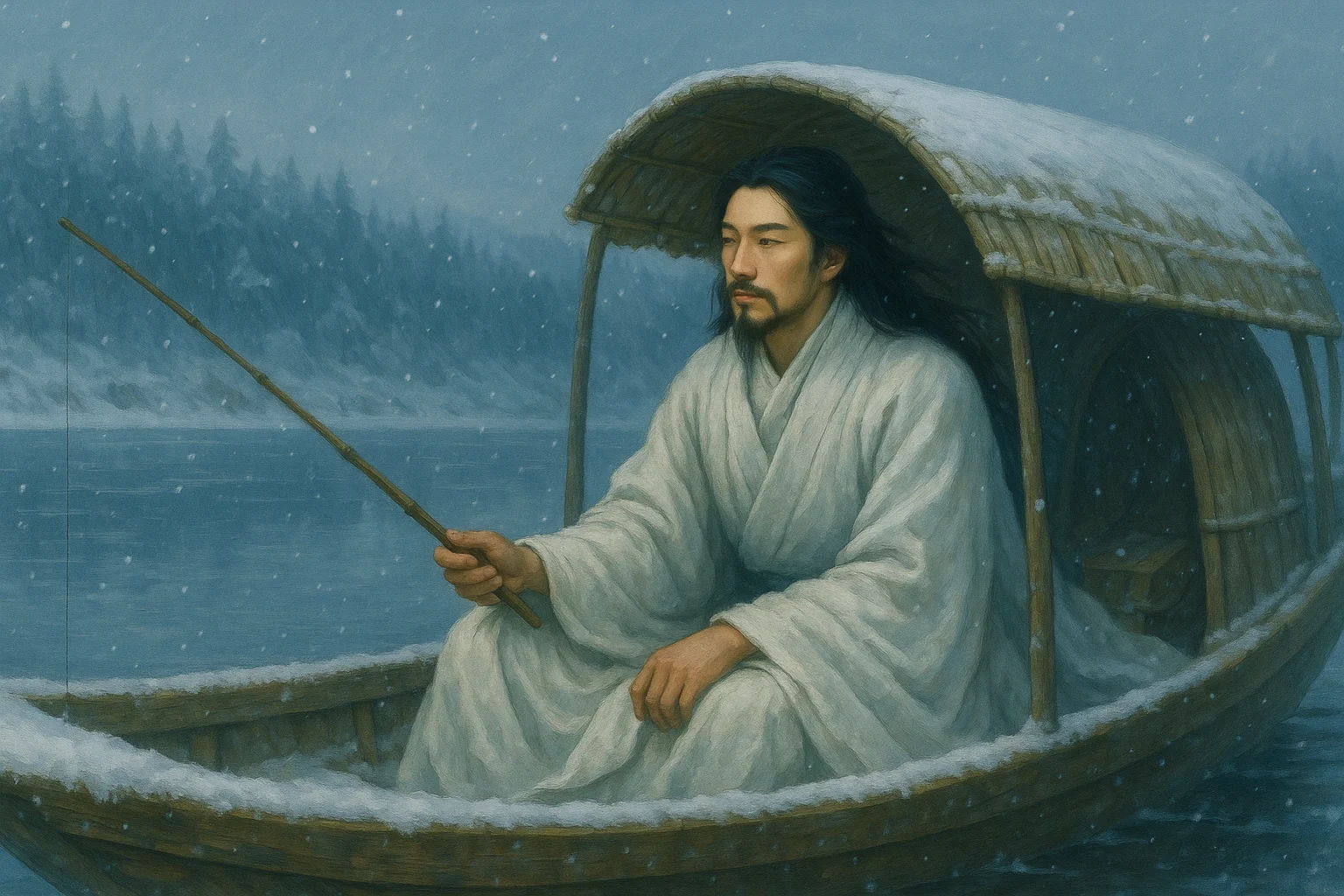
Liu Zongyuan (柳宗元, 773 - 819), a native of Yuncheng in Shanxi province, was a pioneering advocate of the Classical Prose Movement during China's Tang Dynasty. Awarded the prestigious jinshi degree in 793 during the Zhenyuan era, this distinguished scholar-official revolutionized Chinese literature with his groundbreaking essays. His prose works, remarkable for their incisive vigor and crystalline purity, established the canonical model for landscape travel writing that would influence generations. As a poet, Liu mastered a distinctive style of luminous clarity and solitary grandeur, securing his place among the legendary "Eight Great Masters of Tang-Song Prose" - an honor reflecting his enduring impact on Chinese literary history.






